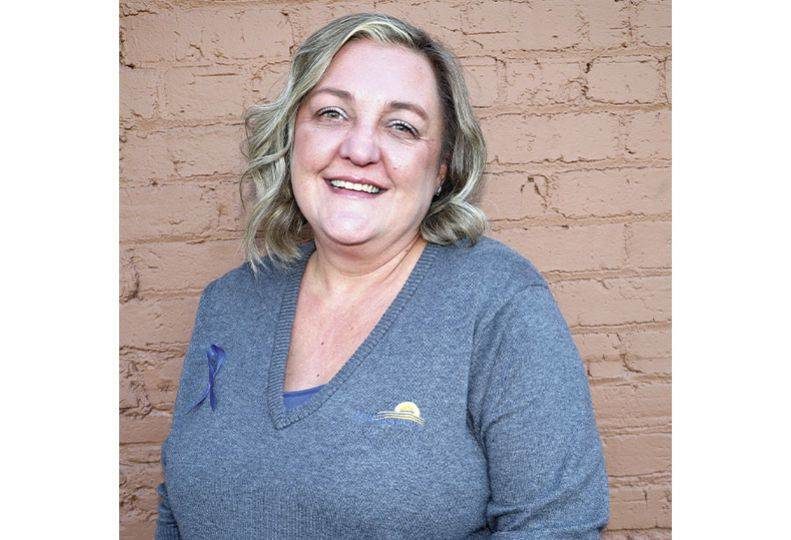
Home » Meet & Greet Kelli Miller, interim CEO at Frontier Behavioral Health
Meet & Greet Kelli Miller, interim CEO at Frontier Behavioral Health

November 22, 2023
Kelli Miller has been appointed interim CEO of Frontier Behavioral Health following the unexpected death of Jeff Thomas, 62, from respiratory complications on Aug. 25.
Prior to stepping into this role, Miller, 46, was the organization’s chief administrative officer, a position she held for the past nine years of her 24-year career with the organization. Throughout her tenure, Miller has served in several roles including customer service representative, accountant, and director of compliance and clinical support.
A born-and-raised Spokanite, Miller graduated from West Valley High School, and earned a bachelor’s in interdisciplinary studies and a master’s in public administration from Eastern Washington University.
Frontier Behavioral Health was established in 2011 following the merger of Family Service Spokane and Spokane Mental Health. The nonprofit provides clinical and cultural behavioral health care and related services including crisis response services, psychiatric and psychological services, and inpatient and outpatient services. It has an annual budget of $98 million and 18 locations that serve an estimated 20,000 patients and families each year.
The Journal recently sat down with Miller to discuss how she plans to lead the organization during this transition, what lessons she learned from Jeff Thomas that she hopes to continue, and how she came to work in health care administration.
How did you choose this career field?
Growing up, I was always the kid who wanted to know more.
When I was the customer service representative at Family Services—before it merged with Spokane Mental Health to become Frontier—I was privy to a lot of knowledge about our organization. I worked with a lot of fantastic people who put up with my endless questions about how things worked, including Jeff.
Eventually I went back to school for my MBA. I was sitting in class one day and had an “aha” moment while listening to a guest speaker talk to us about getting a master’s in public administration. It felt like the sky opened and for the first time, I knew exactly what I wanted to do. I switched over from my MBA and received an MPA instead.
Shortly after that, we were at a national conference and my conviction was further cemented by something a speaker said to us, which was that in her experience with health care, compassion heals the places medicine can’t touch. That’s when I heard it loud and clear, the thing that I had been searching for and spent so much of my learning career trying to figure out.
It’s a bit rare these days to stay with a single employer for so long.
My colleagues, including Jeff, always supported my constant desire to learn, to give back. Frontier Behavioral Health is such an amazing place to work. I am very blessed that there was always an opportunity to learn more, to have access to so many amazing mentors in the field who were always honest and candid in regard to my many questions of how things worked. That support really fueled my passion to remain dedicated to an agency that believes in you.
Speaking of Jeff, what did he teach you as a mentor that you wish to continue?
I can count probably thousands of people who were positively impacted by him. Jeff had so many amazing qualities, way too many to list.
But for me, it’s his compassion and advocacy to help those that struggle with mental health and substance use disorders or substance use issues. He believed so deeply in getting services to those who need us the most. He cared about doing all that we could to reach as many people as we can through not just our services, but through partnerships through the Spokane community.
You mentioned compassion twice—what role does that play in your field?
That to me is important, because at the end of the day, we all are going to be consumers of health care in some way. We’re all going to need help in a health care system, but what we also need is hope, companionship, and care. That’s the basis of human nature. None of what we do works if we don’t have compassion for what we’re doing and those we’re serving.
That can be said in every industry. But I think in health care, where people are more vulnerable, maybe more frightened, or have a long experience with trauma, or feeling forgotten, it couldn’t be more important.
During this interim role, what do you wish to accomplish?
One of the highest priorities of the organization is of course beginning that recruitment process for the permanent CEO position. We know that will take time.
As for what I am doing in the interim, that answer changes daily. But when the board offered me this opportunity, my dedication to them was to ensure that Frontier Behavioral Health remains stable in every sense of the word, for the organization, but more importantly that it remains a stable provider for our clients.
There are so many unknowns. Especially at a time where we are all very much grieving the loss of Jeff. But to say my focus is status quo would be incorrect because in health care in general, and behavioral health care, people don’t stay status quo. We have an environment that is forever changing, always evolving with new initiatives, new programs, new need. So our goal is to stay stable while still being flexible and creative, while keeping up with the changes of behavioral health care in our community, in our state, and at the national level.
Latest News Health Care Q&A Profiles
Related Articles
Related Products


![Brad head shot[1] web](https://www.spokanejournal.com/ext/resources/2025/03/10/thumb/Brad-Head-Shot[1]_web.jpg?1741642753)

